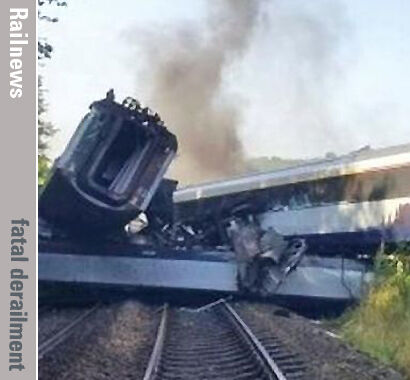A Scottish court is to deal with the prosecution case against Network Rail in connection with the fatal Carmont derailment.
Three people on board a train were killed three years ago when it was derailed by debris washed on to the track near Stonehaven on 12 August 2020, which was a day of heavy storms.
Some of the vehicles in the ScotRail HST were overturned down an embankment in the crash, which claimed the lives of 45-year old driver Brett McCullough, 58-year old conductor Donald Dinnie and 62-year old passenger Christopher Stuchbury. Fortunately there were few people on board because of the Covid pandemic but six other passengers received mainly minor injuries.
The HST had been heading south to Glasgow but was turned back at Carmont after other line blockages were reported, and had been returning to Aberdeen when the accident happened.
The charges have not been specified, but will be brought at Aberdeen High Court on 7 September by His Majesty’s Advocate under section 76 of the Criminal Procedure (Scotland) Act 1995, which applies where notice has been given that a defendant will plead guilty.
Network Rail cannot comment on the forthcoming hearing, but said: ‘The Carmont derailment and the tragic loss of Christopher Stuchbury, Donald Dinnie and Brett McCullough was a terrible day for our railway and our thoughts remain with their families and all those affected by the accident.
‘The Rail Accident Investigation Branch report into Carmont made clear that there were fundamental lessons to be learnt by Network Rail and we have supported the investigation process.
‘Since August 2020, we have been working hard to make our railway safer.’
The RAIB highlighted gaps in Network Rail’s procedure for maintaining records about changes to its infrastructure, a lack of guidance or additional support for control room staff during a very busy time, a failure to recognise that existing measures did not fully deal with the risk from very heavy rain, and also the absence of an effective strategy to deal with the general threat to the stability of earthworks in extreme weather.
The report also noted that HSTs, designed in the late 1970s, are not as crash-resistant as newer trains, and commented that it was ‘more likely than not’ that the consequences of the derailment might not have been so bad if the train had met modern crashworthiness standards.
The RAIB made 20 recommendations, many to Network Rail. Others were intended for the RSSB, the Rail Delivery Group or rolling stock operators.
Kevin Lindsay, who is ASLEF’s full-time organiser in Scotland, said: ‘We welcome the news that Network Rail is being held to account for its endemic and systemic failings which resulted in the tragic deaths of three people, including train driver Brett McCullough. But we are still angry and disappointed at those failings. We appreciate that Network Rail has accepted responsibility for their failures and their commitment to ensuring a tragic incident like Carmont never happens again.
‘However, such corporate failure must result in penalties for those responsible. Full justice should mean that penalties are laid squarely at the door of those individuals in senior management roles who presided over the corporate failure that has seen Network Rail end up in court – and accepting culpability for their role in this tragedy.’


